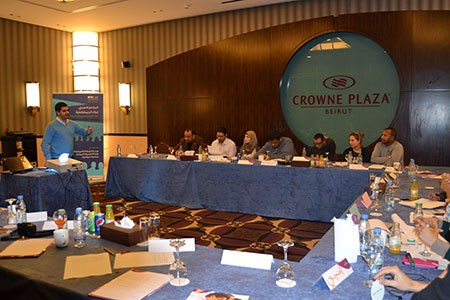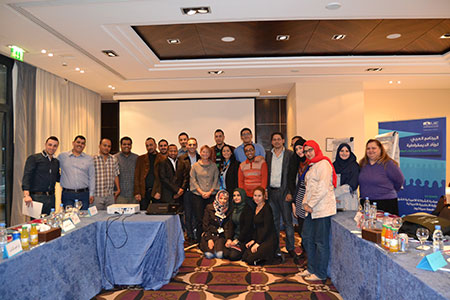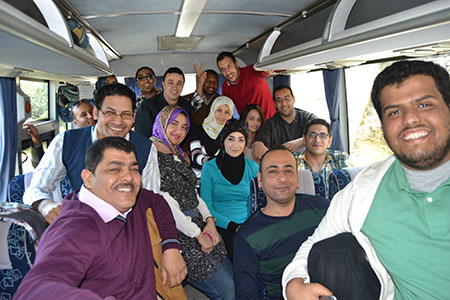- English
- عربي
News and Events
Week 3 Report
Summary of the third week of Leaders for Democracy (LFD) 2015 Program
by Hussein Al Sabbagha
Early on in a series of conferences with Dr. Salim Al Sayegh on conflict resolution and negotia- tion, Dr. Adel Abdel Sadeq (Arab Republic of Egypt) introduced Dr. Salim Al Sayegh on Monday through his biographical profile that is filled with achievements and benevolence. Dr. Sayegh commenced his speech by discussing the importance of disagreement with others, the construction of a new social contract, management of cultural diversity and having the ability to lead to attain community leadership.
Dr. Sayegh emphasized the significance of adopting peaceful problem solving as the starting point; he highlighted the importance of linking dialog to positive results; achieving reconcilia- tion in general; and leaders’ ability to question, negotiate and possess the proper ethics of dialog given that these proper ethics are an element of diplomatic strength in today’s world.
He also discussed the significance of having a mediator that is accepted by both parties in order for the dialog to be fruitful and produce results and that reconciliation between the two parties takes place through negotiation under the rule of law, un-amended. Also, the causes of conflicts were addressed and the importance of wealth creation prior to wealth spreading allowing us all to believe in social justice and that political diagnosis should be based on community priorities.
 Dr. Sayegh addressed the causes of conflict in general as defined by sociologists; primarily relationships, second information, third interests, fourth structural reason (such as the misman- agement of diversity) and fifth values (such as the cause of Jerusalem). Hence, there is a multitude of scientific studies that are useful in the decision-making process; some decisions are imposed such as the decision made in an oppressive or manipulative way; there could be a Board of Directors that makes a decision; or the advice of a third party can be sought to formu- late the decision based on technical information and refer the matter to experts in the relevant scientific subject matter if the subject at hand was technical or vocational; as for the last factor in the negotiation process, it is the element of time that could either mean gaining time, deferment, finding alternative solutions including the refusal to make or reach a decision and results.
Dr. Sayegh addressed the causes of conflict in general as defined by sociologists; primarily relationships, second information, third interests, fourth structural reason (such as the misman- agement of diversity) and fifth values (such as the cause of Jerusalem). Hence, there is a multitude of scientific studies that are useful in the decision-making process; some decisions are imposed such as the decision made in an oppressive or manipulative way; there could be a Board of Directors that makes a decision; or the advice of a third party can be sought to formu- late the decision based on technical information and refer the matter to experts in the relevant scientific subject matter if the subject at hand was technical or vocational; as for the last factor in the negotiation process, it is the element of time that could either mean gaining time, deferment, finding alternative solutions including the refusal to make or reach a decision and results.
 He also spoke about re-addressing the problem through a strong management; that is why, negotiation is a social movement that starts when you reach out to others and they respond (positively or negatively); it requires having more than one party be it bilateral or multilateral; the faith in disagreement and the need for the other; and respect for the choices of both parties (you must have your own choices) and that negotiation must be on the agenda in order to identify the starting point and to search for a solution that would be acceptable to all.
He also spoke about re-addressing the problem through a strong management; that is why, negotiation is a social movement that starts when you reach out to others and they respond (positively or negatively); it requires having more than one party be it bilateral or multilateral; the faith in disagreement and the need for the other; and respect for the choices of both parties (you must have your own choices) and that negotiation must be on the agenda in order to identify the starting point and to search for a solution that would be acceptable to all.
To properly prepare for the negotiation phase, there ought to be a negotiation roadmap such as establishing a summary of the common problem amongst all parties, defining the surround- ing circumstances or the overall framework, considering imbalances in strength and capacities to influence others the reason for which the negotiator must conceal the truth but that does not mean actually telling lies!
Furthermore, Dr. Sayegh pointed out the importance of starting a negotiation session with alternative solutions arrived at through negotiation so that we are not confined to one party-solution or one goal, rather the need to find the best solution to agree upon through negotiation. Of utmost importance is actually knowing the gap between thoughts during negotiations - which is to question what ones or the other person wants – and between finding the common ground between the negotiating parties.
Dr. Sayegh emphasized as well the most important elements in negotiation which is having clear negotiation objectives, defining the subject and the time frame to attain such an objec- tive.
In discussing political Islam, former deputy Mosbah Al Ahdab moderated a session on the phenomenon of political Islam in Lebanon and the Arab world focusing on the background that gave rise to said phenomenon, its goals and objectives and the future of the region as it further develops. Al Ahdab also talked about the elections in Lebanon and the Lebanese parliamentary system. The leaders participated in a questions and answers session related to the topic whereby Al Ahdab provided clarifications in order to reach important conclusions regarding a democratic parliamentary system and the real problem facing Lebanon and most Arab nations due to the growing influence of extremism and the element of discrimination amongst Arab people despite the availability of tremendous capacities in the Arab world. The issue of political Islam in the region was touched upon as well effective ways to combat this extremism.
After three days with Dr. Sayegh, Mr. Ayman Mhanna held his session on Thursday. He talked about the role of the media in campaigns and its importance for civil society organizations as well as the adequate medium and campaign to harness in the local media and obtain the required quality. He also discussed the Maslow Hierarchy on value and social principals; there- after we conducted a workshop on launching a media campaign to convince the public of a product or commodity to be marketed through working groups and through a random organiza- tion of the groups; and the use of persuasion skills and addressing the masses to market the product.
At the end, Ms. Lori Haytaian lectured on Friday about the organization of natural resources. She discussed extraction methods for natural resources, the supply chain that organizations establish to extract natural resources and ways to build up the capacities of organizations and institutions that export oil. She also discussed transparency in the natural resources extraction process on the part of specialized companies. We conducted a workshop on the core values to extract natural resources and related methods.
Sunday March 15th was the date of the first cultural trip for the Leaders for Democracy organ- ized by the Association for Forests, Development & Conservation (AFDC). The objective of the field trip was to introduce the participants to the cultural, religious and environmental heritage of Lebanon by visiting the Cedars Forest in Bsharri, enjoying the snow, visiting the Gibran Museum, and a stopover at the holy valley in Qannoubine. It was a field trip out of the ordinary for it was an enjoyable adventure organized by the team whose members include the Program Manager at AFDC, Mr. Jawad Abu Ghanem, the touristic guide, Mr. George Zougheib who took charge of loading the participants onto small buses throughout the valley on unpaved paths where they experienced the beauty of nature free of manmade vandalism. At the bottom of the valley, the participants had lunch at a popular Lebanese restaurant where the owner, Abu Joseph, offers traditional homemade food.

